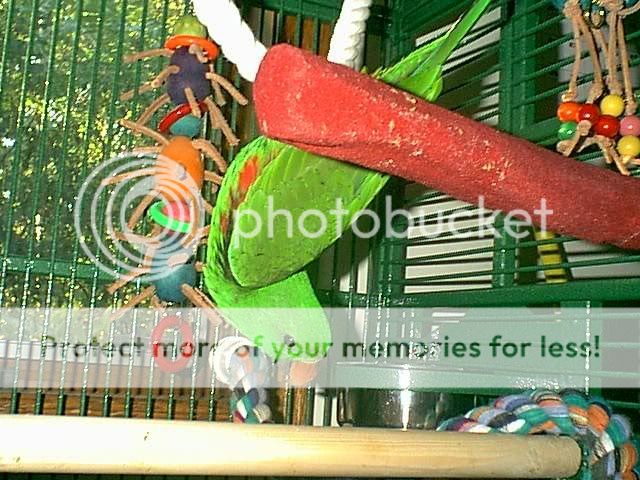Emmylou42188
New member
Hey everyone.
For over a year, I've been preparing for my new baby eclectus. I spent forever collecting toys, getting her cage ready, finding a good breeder, getting large natural wood perches, etc. I have read and am a member of every forum I could get my hands-on, and have read every suggestion, article, and seen every video there is. I found a great avian vet. I even drove for 4 hours one way to interact with two different eclectus' to make sure they were the right parrot for me. I am familiar with their diets backwards and fowards, so needless to say, I was very prepared.
So I just brought home my female S.I. eclectus this past Sunday. She is absolutely beautiful. She eats a ton, and is very very happy. She plays with the toys in her cage, loves her large perch and seems to be doing well, except for one thing. She absolutely hates me.
She seems to not respond to women whatsoever. Whenever a man is near, she walks up and steps right up on them. She even has taken a particular liking for the man I live with, constantly cooing to him or squawking when she sees him. I can spend all day around her and she doesn't make a sound. Not a single noise.
If I get close to her, she fluffs up, lunges, and bites me. I don't pull away from her, but afterwards, I'll walk away so as not to push her too far, but I don't respond to the biting. I brought her to the avian vet, also female, and after the tests, I'm relatively sure I'm screwed on this bird every approaching me.
I know it's only been a few days. I've asked that the guys give her some distance because when she sees them, she runs to them like she's been abused. I have taken over feeding her. I constantly talk to her softly and calmly so she knows the sound of my voice, and it seems to get worse by the minute.
I'm just going to be patient and hope that she comes around, but around other females, she seems to act the same.
I'm just disappointed and at a loss. Has this happened to anyone else?
For over a year, I've been preparing for my new baby eclectus. I spent forever collecting toys, getting her cage ready, finding a good breeder, getting large natural wood perches, etc. I have read and am a member of every forum I could get my hands-on, and have read every suggestion, article, and seen every video there is. I found a great avian vet. I even drove for 4 hours one way to interact with two different eclectus' to make sure they were the right parrot for me. I am familiar with their diets backwards and fowards, so needless to say, I was very prepared.
So I just brought home my female S.I. eclectus this past Sunday. She is absolutely beautiful. She eats a ton, and is very very happy. She plays with the toys in her cage, loves her large perch and seems to be doing well, except for one thing. She absolutely hates me.
She seems to not respond to women whatsoever. Whenever a man is near, she walks up and steps right up on them. She even has taken a particular liking for the man I live with, constantly cooing to him or squawking when she sees him. I can spend all day around her and she doesn't make a sound. Not a single noise.
If I get close to her, she fluffs up, lunges, and bites me. I don't pull away from her, but afterwards, I'll walk away so as not to push her too far, but I don't respond to the biting. I brought her to the avian vet, also female, and after the tests, I'm relatively sure I'm screwed on this bird every approaching me.
I know it's only been a few days. I've asked that the guys give her some distance because when she sees them, she runs to them like she's been abused. I have taken over feeding her. I constantly talk to her softly and calmly so she knows the sound of my voice, and it seems to get worse by the minute.
I'm just going to be patient and hope that she comes around, but around other females, she seems to act the same.
I'm just disappointed and at a loss. Has this happened to anyone else?

